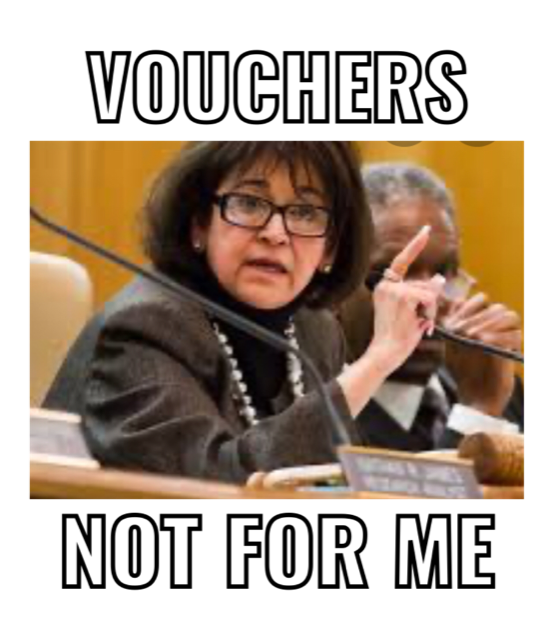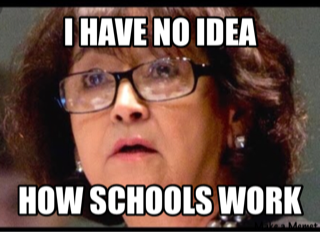The Tennessee General Assembly today passed a bill to create a voucher system for students with IEPs. The plan was limited from its original scope to only apply to the most severe cases.
The vote in the House was particularly close, with 52 representatives voting in favor — 50 are required for passage.
What does the bill do?
If you ask the sponsors (and a number of members did), they really don’t know. Essentially, the legislation (HB138) creates individual education accounts of around $6600 to be provided to the parents or guardians who meet the qualifications in the amendment. They must have an IEP. Around 18,000 students (those with autism, blind or deaf, mental disabilities, and orthopedic disabilities) qualify.
A similar program in Florida, started in 1999, has been expanding rapidly. And, it’s been subject to fraud. When asked about what safeguards Tennessee’s plan will have, the sponsors said that the bill calls on the departments of education and health to qualify vendors. When asked what standards may be used to qualify vendors, the sponsors said they didn’t know.
When asked if the money will be distributed as a debit card or a bank account or a voucher, the sponsors didn’t know.
An important element of the bill is that any parent/guardian who accepts the voucher MUST forfeit their rights under the Individuals with Disabilities Education Act. That’s a pretty big deal. When asked what rights, exactly, parents would be forfeiting, Rep. Roger Kane, a co-sponsor, said, “They are all listed in the IDEA.”
Indeed they are. And it’s pretty important. The rights include:
The right of parents to receive a complete explanation of all the procedural safeguards available under IDEA and the procedures in the state for presenting complaints
Confidentiality and the right of parents to inspect and review the educational records of their child
The right of parents to participate in meetings related to the identification, evaluation, and placement of their child, and the provision of FAPE (a free appropriate public education) to their child
The right of parents to obtain an independent educational evaluation (IEE) of their child
The right of parents to receive “prior written notice” on matters relating to the identification, evaluation, or placement of their child, and the provision of FAPE to their child
The right of parents to give or deny their consent before the school may take certain action with respect to their child
The right of parents to disagree with decisions made by the school system on those issues
The right of parents and schools to use IDEA’s mechanisms for resolving disputes, including the right to appeal determinations
Depending on the child’s disability and a school system’s ability, the parents may be entitled to provision of services by private providers at school system expense. The advantage being that there is accountability to the LEA for providers offering the services.
So, forfeiting one’s IDEA rights is a big deal. And it could mean kids are not well-served by private providers.
An analysis of similar programs across the country found that none of them were subject to state testing to determine student outcomes and that accountability provisions were weak or non-existent. This analysis also noted that as early as 2003, Florida realized its 4-year-old program was subject to fraud. But this 2011 report highlights significant fraud ongoing in the expanding Florida program.
Just a four years ago, Tennessee authorized the creation of the Tennessee Virtual Academy operated by for-profit provider K-12, Inc. At the time, Senator Andy Berke warned of K-12, Inc.’s problems in operating virtual schools in Arizona. He asked how we could be sure there wouldn’t be fraud in Tennessee’s virtual school operated by K-12. The sponsor, Senator Dolores Gresham, said that the accountability would be built-in by the rules.
Yesterday, after $43 million spent on K-12, Inc. in Tennessee, Senator Gresham led the opposition to a last-ditch effort to keep K-12, Inc. open. To her credit, this was an admission that the experiment she had championed had failed. Gresham correctly noted that the Tennessee Virtual Academy was the worst performing school out of 1700 Tennessee schools.
Here’s the problem: Tennessee taxpayers won’t get their $43 million back. More importantly, the children who were poorly-served by TNVA can’t get their time back. They will return to other education environments behind their peers and possibly unable to complete school.
If the IEP voucher program fails, what will happen in two or three or four years to the children who were in the program? How will we ensure the accountability measures work for this program when they failed miserably for TNVA? And if the argument is that they worked for TNVA because the school is closing now, what happens to those kids who might lose years of their lives to a failed experiment?
What did the Tennessee General Assembly just do?
For more on education politics and policy in Tennessee, follow @TNEdReport





